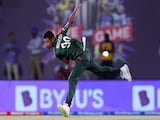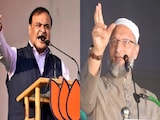Jaipur:
The Jaipur Literature Festival begins today. It runs five days and will host 250 authors, including Michael Ondaatje and David Hare. Talk show queen and empress of much else Oprah Winfrey will also attend. But such high-profile visits have been over shadowed by the uncertainty and controversy surrounding author Salman Rushdie's visit.
Here are the five big facts on the Jaipur-Lit-fest-Rushdie controversy...
1) Salman Rushdie, who won the Booker Prize for Midnight's Children, was meant to speak on the opening day and at a few other sessions during the rest of the festival. After an Islamic seminary based in Uttar Pradesh called for protests against Mr Rushdie's visit, there is uncertainty about whether the author will attend the festival. The Darul Uloom Deoband had asked that his visa be cancelled; other Muslim clerics have called for protests. Mr Rushdie had tweeted that he doesn't need a visa because he has Person of Indian Origin status, which allows him to travel freely to India. Mr Rushdie has made several personal trips to India in recent years. He also attended the 2007 edition of the Jaipur Literary Festival.
2) The Congress government in Rajasthan has said it is worried about the implications of Mr Rushdie's visit. This week, Rajasthan chief minister A Gehlot met Home Minister P Chidambaram in Delhi to discuss security arrangements at the festival in the event of an appearance by the writer. Mr Gehlot said that no state government can ignore the potential law and order consequences of a controversy like this. There is heavy security at the festival venue though senior police officers say that they have no confirmation about his participation.
3) Critics say that the government's silence on Mr Rushdie's visit is spawned by the UP elections. 18% of the population here is Muslim. And the Congress is hoping to make significant gains in the state.
4) Mr Rushdie's book, The Satanic Verses, was published in 1988. It continues to provoke anger among a section of Muslims who say it is blasphemous and presents a distorted interpretation of the Quran. India banned the book a month after its publication, fearing it would provoke communal tension. The decision was criticized by those who saw it as a capitulation to hard-liners, and a failure to protect the right to free speech. The government of the day tried to limit the damage by saying that the decision was no reflection on the artistic merit of the book.
5) In 1989, Iranian spiritual leader Ayatollah Ruhollah Khomeini issued a fatwa calling for Mr Rushdie's assassination. The writer was forced to go into hiding and change his residence repeatedly. The UK, where he was staying, backed him and provided him with police protection. In 1998, the government of then Iranian President Mohammad Khatami said that it no longer supported his killing in an attempt to mend diplomatic relations with the UK.
Here are the five big facts on the Jaipur-Lit-fest-Rushdie controversy...
1) Salman Rushdie, who won the Booker Prize for Midnight's Children, was meant to speak on the opening day and at a few other sessions during the rest of the festival. After an Islamic seminary based in Uttar Pradesh called for protests against Mr Rushdie's visit, there is uncertainty about whether the author will attend the festival. The Darul Uloom Deoband had asked that his visa be cancelled; other Muslim clerics have called for protests. Mr Rushdie had tweeted that he doesn't need a visa because he has Person of Indian Origin status, which allows him to travel freely to India. Mr Rushdie has made several personal trips to India in recent years. He also attended the 2007 edition of the Jaipur Literary Festival.
2) The Congress government in Rajasthan has said it is worried about the implications of Mr Rushdie's visit. This week, Rajasthan chief minister A Gehlot met Home Minister P Chidambaram in Delhi to discuss security arrangements at the festival in the event of an appearance by the writer. Mr Gehlot said that no state government can ignore the potential law and order consequences of a controversy like this. There is heavy security at the festival venue though senior police officers say that they have no confirmation about his participation.
3) Critics say that the government's silence on Mr Rushdie's visit is spawned by the UP elections. 18% of the population here is Muslim. And the Congress is hoping to make significant gains in the state.
4) Mr Rushdie's book, The Satanic Verses, was published in 1988. It continues to provoke anger among a section of Muslims who say it is blasphemous and presents a distorted interpretation of the Quran. India banned the book a month after its publication, fearing it would provoke communal tension. The decision was criticized by those who saw it as a capitulation to hard-liners, and a failure to protect the right to free speech. The government of the day tried to limit the damage by saying that the decision was no reflection on the artistic merit of the book.
5) In 1989, Iranian spiritual leader Ayatollah Ruhollah Khomeini issued a fatwa calling for Mr Rushdie's assassination. The writer was forced to go into hiding and change his residence repeatedly. The UK, where he was staying, backed him and provided him with police protection. In 1998, the government of then Iranian President Mohammad Khatami said that it no longer supported his killing in an attempt to mend diplomatic relations with the UK.















